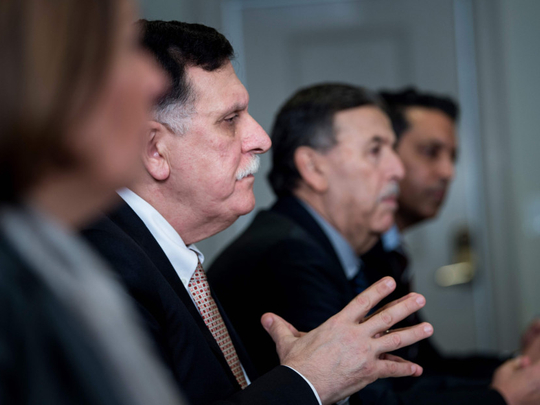
On Friday, December 1, the United States subtly — without publicity — changed its policy towards Libya.
America has, of late, purposely avoided meaningful engagement in Libya’s quagmire. US President Donald Trump has declared several times that the US had “no interest” in Libya. One can only imagine he felt it has been a debacle that belonged to the Barack Obama-Hillary Clinton era, and thus not his to inherit.
However, by arranging the short ‘meet and greet’ recently between Trump and the United Nations selected Prime Minister Fayez Sarraj, head of Government of National Accord (GNA), and followed up by substantive meetings with Sarraj at the US State Department, the US has de facto unwittingly interfered in Libyan internal affairs, and stirred the pot.
The truth is that Sarraj appears like “a horse that can’t run”.
A loose coalition of militias — as Sarraj terms them as “his Forces” — is all Sarraj has, apart from (and most importantly) recognition from the UN.
Those militias are undisciplined young men who find themselves in regular skirmishes with Field Marshall Khalifa Haftar’s Libyan National Army (LNA) and losing out to the LNA on most occasions.
The official statement from US State Department spokeswoman Heather Nauert last Friday said: “Attempts to bypass the UN-facilitated political process or impose a military solution to the conflict would only destabilise Libya and create opportunities for ISIS (Daesh or the self-proclaimed Islamic State of Iraq and the Levant) and other terrorist groups to threaten the United States and our allies.”
Two years ago, the Obama administration oversaw the creation and selection of individuals that now make up the GNA/PC, Sarraj, plus eight other Libyans.
Then, it was legitimised by a United Nations Mission in Libya (UNMIL), now headed by Gassan Salame, and labelled as a UN-recognised Government, assuming the joint name of the Government of Accord (GNA) and, for some reason, was in tandem with the Presidential Council (PC). The GNA/PC has not achieved much. The GNA itself boasts of some ministers, mostly in name only. Not a single one was elected by the Libyan people — instead they were selected solely by the UN.
The huge disillusionment, distrust and hatred, even, of the GNA by the Libyan people cannot be overstated.
The GNA government in the West only occupy one Tripoli Naval base because the city itself is too dangerous for them.
Field Marshall Khalifa Haftar’s LNA is a proper army compared to the coalition of bandits and militias, on which Sarraj is forced to depend on.
In addition, and most significantly, the LNA has captured the eastern oil crescent, where the bulk of Libya’s oil reserve exists. The LNA also recaptured Benghazi, the eastern capital, and has subsequently pushed Daesh and other adversaries into retreat. Haftar’s successes have defeated terrorists and extremist militias, many of whom were sponsored by the Muslim Brotherhood. Many Arab countries designate the Muslim Brotherhood as a terrorist organisation, including many US Arab allies in the region. The UN and US State Department seem to forget that Haftar, together with his LNA and the elected parliament and government in the east, controls more than 75 per cent of the country, along with the vast majority of its oil reserves.
Several countries have shown their support for Haftar and the elected parliament in eastern Libya. The French have even provided special forces to help Haftar battle extremists in Benghazi. Thus, in reality, many governments favour Haftar over Sarraj. Are the Americans unaware of these facts?
It is understood that the US State Department is currently considering a request from Sarraj to recommend to the UN a partial lifting of the arms embargo to only his “forces”. Sarraj’s “forces” are mostly fighting the LNA. How ridiculous is it that this is being contemplated, knowing that it would only escalate the troubles in Libya?
Also, if weapons were delivered, as Sarraj requested, a good portion would be illegally sold by the militias on to terrorists, Daesh and/or Al Qaida. Last week, Salame had declared that Libya would be ready for elections early next year. This a totally unrealistic prospect now.
Ahmad Al Mismari from Haftar’s LNA forces reiterated the threat that “they will end the Libyan crisis by decisive military action by the end of this year”. That is a very emphatic statement. He also added that “it is not possible for elections to be held next March”, though that was agreed in a meeting with French President Emmanuel Macron. The meeting also included Haftar and Sarraj. Reinforcing that on December 3, the Russian Foreign Ministry spokesperson for Libya, Lev Dengov, said: “It is impossible to speak about a date for elections in Libya, and it is premature to discuss the issue before an officially registered consent of the parties.”
With Benghazi free — courtesy Haftar, not Sarraj — the city is rebuilding itself. Flights and shipping in the east of the country can only be to and from Benghazi by order of Haftar, not Sarraj. Similarly, courtesy Haftar, all the main oil ports are operating in the country, with the exception of one in the west.
One would have thought the Americans were smarter, backing a winning horse.
Richard Galustian is a business and security analyst who has lived in Libya since 2011.








